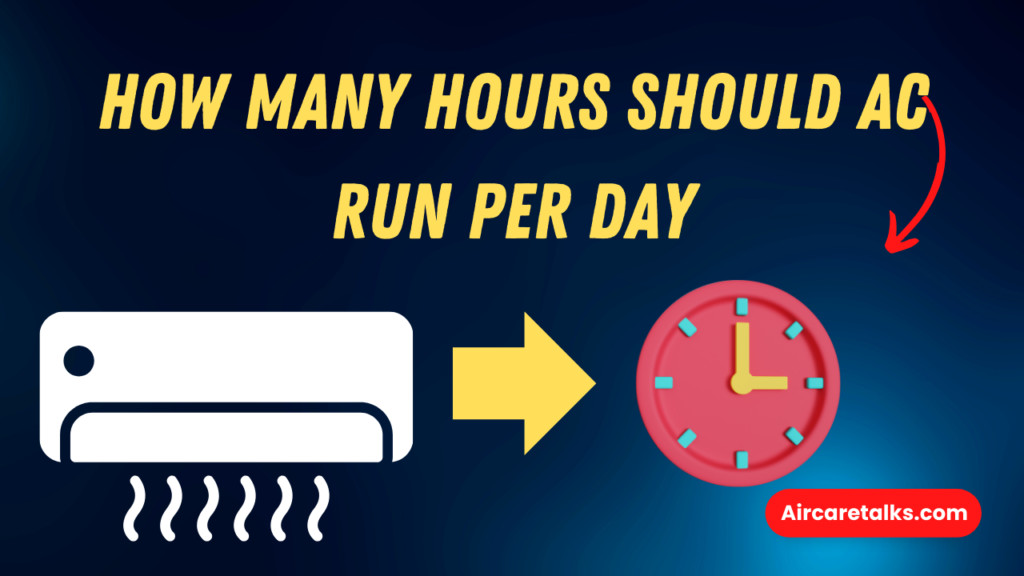
How Many Hours Should AC Run Per Day | Regarding air conditioning, one of the most common questions homeowners have is, “How long should I run my AC per day?” The answer depends on several factors, including the size of your home, the efficiency of your AC unit, the climate you live in, and your comfort preferences.
With some general guidelines and considerations, you can determine the optimal daily air condition runtime for your air conditioner.
Contents
What Factors Impact AC Runtime?
There are a few key factors that determine how many hours an air conditioner needs to run each day:
Size of the space: Larger homes require longer AC runtimes to reach and maintain the desired temperature. Longer runtimes are needed to condition the larger volume of indoor air.
Efficiency of the AC unit – More efficient systems with higher SEER (Seasonal Energy Efficiency Ratio) ratings require less runtime to cool a home. Upgrading an older, inefficient AC unit can reduce runtimes.
Outdoor temperatures: Hotter outdoor temps cause air conditioners to run longer to counteract the increased heat load on the home. Cooler temps allow ACs to cycle off more frequently.
Indoor temperature goal: Lower desired indoor temps require longer run times to remove more heat from the air. Higher temperature settings allow for shorter cycles.
Insulation and air sealing: Well-insulated, draft-free homes retain cooled air better, allowing the AC to run less frequently. Poor insulation and air leaks cause increased runtimes.
Home layout and features: Vaulted ceilings, large windows, and multiple stories can increase runtimes. Simple designs help minimize AC requirements.
Recommended Daily AC Run Time
Most HVAC experts agree that an efficient, properly sized air conditioner should run for around 50-60% of the day to maintain a comfortable temperature and indoor air quality. This equates to 12-15 hours of runtime per day.
Longer cycles are needed on sweltering days above 95°F. Shorter run times are sufficient for more mild days. During spring and fall, when temps are more relaxed, an AC may only need to run 8-12 hours daily.
In moderate climates, a typical runtime range is 10-14 hours on average summer days. Scorching temperatures often require 14-18 hours daily to handle the extreme heat. Mild climates may only need 6-10 hours on a typical summer day.
Letting your AC run nonstop 24/7 is usually not recommended or necessary for adequate comfort.
Cycling the unit on and off occasionally rather than running continuously can help remove humidity as well. Most HVAC pros suggest an on/off cycle of 15-30 minutes between each runtime.
do you face Why Does My Window AC Sound Like Water Running? issue then Find the best way here
Factors That Shorten Needed AC Run Time
Certain factors allow an air conditioner to meet the cooling needs of a home in fewer hours per day:
Newer, higher efficiency systems: Upgrading an old AC unit to a new Energy Star-certified model can significantly reduce run times. New units can be up to 50% more efficient.
Oversized AC unit: An oversized unit has extra capacity, allowing it to cool the home faster and with shorter runtimes.
Programmable thermostat: Using a programmable thermostat allows you to raise temps when no one is home and lower them before you return. You avoid unnecessary runtimes.
Ceiling fans: Running ceiling fans allow you to feel comfortable at slightly warmer temps, avoiding excess AC runtimes. Just be sure to switch the fan direction for summer vs winter.
Preventative maintenance – Replacing filters, cleaning coils, and clearing debris improve efficiency and allow shorter run times.
Smart/connected technology – Smart thermostats with home/away functions and apps give greater control of AC runtimes for savings.
Factors That Increase Needed AC Run Time
On the other hand, specific scenarios will cause an AC system to run longer each day:
Undersized AC unit: An undersized unit will need help to keep up with the cooling demands of the home, causing longer runtimes. Requires frequent cycling, too.
Old, inefficient AC system: Outdated systems with low SEER ratings require longer run times to generate the same amount of cooling.
Limited insulation: Poor insulation, leaky windows, and gaps around penetrations allow cooled air to escape and hot exterior air to enter. AC runs more to compensate.
Large windows or skylights: Lots of glass allows substantial solar heat to enter the home, increasing the AC system’s workload.
Multiple stories: Multi-level homes often have hot upper floors and cool basements, requiring extended run times to condition all areas.
Finding the Right Balance
Determining an adequate daily runtime for your AC is a balancing act. Short, and you may feel uncomfortable indoors. Too long, and you are lowering dehumidification and wasting energy. Consider the recommendations here as general guidelines for typical situations.
Monitor your own home’s conditions and make adjustments to find the optimum hours per day that keep your house cool without overworking the air conditioner.
Minor tweaks to the runtime through innovative technology or thermostat adjustments can pay off with energy savings while still meeting your indoor comfort needs.
With good preventative maintenance and intelligent operation, you can minimize the hours per day your AC needs to work, allowing it to operate more efficiently and provide reliable cooling when required.
Careful control of your AC’s runtime will enable you to strike the perfect temperature balance in your home.
Conclusion
Determining the ideal daily runtime for your air conditioner depends on several factors, like your home’s size, insulation, outdoor temps, unit efficiency, and more.
While there are general recommendations, monitoring your AC to find the sweet spot for your conditions is critical.
With smart settings, maintenance, and some adjustments, you can minimize runtimes for comfort and energy savings.
Proper AC operation comes down to understanding your needs and optimizing run times accordingly.